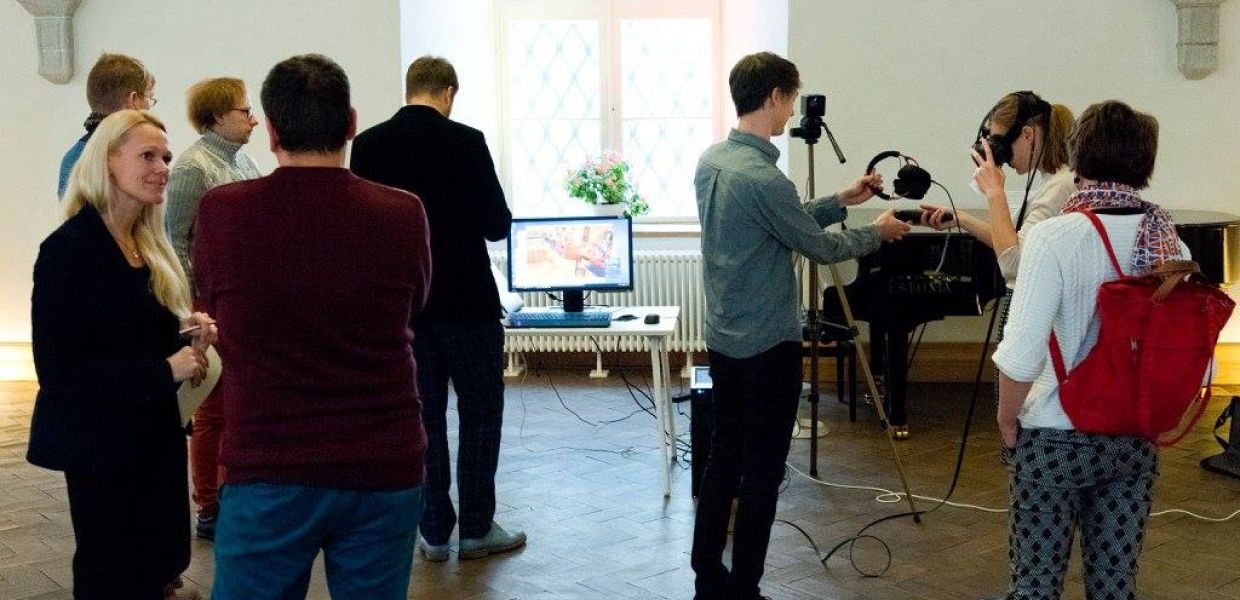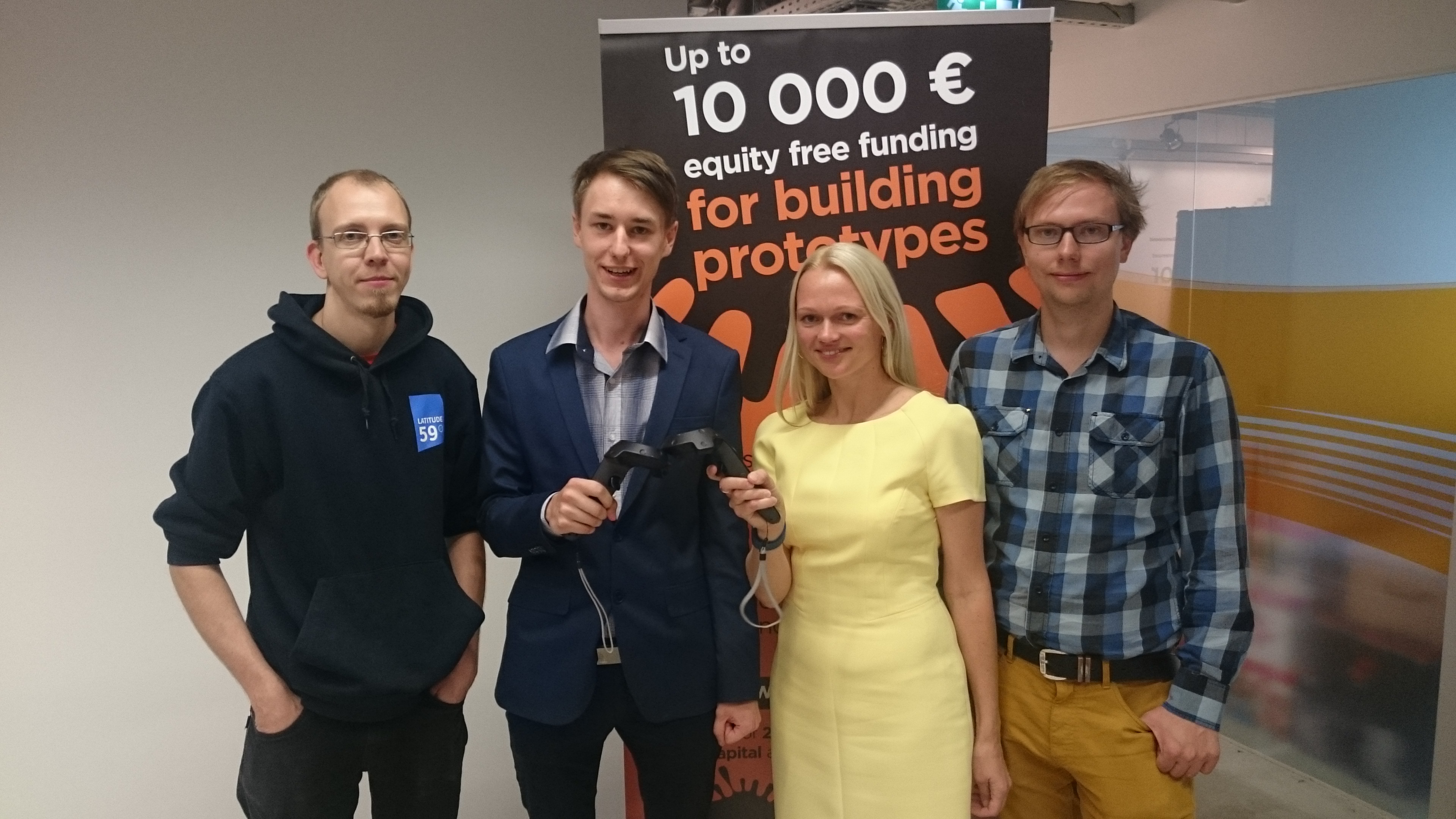Meet VR Quiz: a virtual reality game for a compelling museum experience

One of the winners at Loomehäkk hackathon in Estonia, VR Quiz is a virtual reality game that helps visitors to make the most out of their museum experience. We talked to Õnne Mets from VR Quiz team, to find out more about this game and the plans to take the project to next level.
Your prototype won the Europeana Award during the Loomehäkk 48 hours hackathon. How did you come up with the idea?
Our team at Loomehäkk was one of the biggest with 9 members. Most of us did not know each other before. Some wanted to try out the virtual reality technology and some, like myself, wanted to play with Europeana content, see the event and meet new people. The amount of collections published on Europeana, the Europeana API and the enthusiastic presentation by the Europeana representative James Morley captivated our team. Today, the core team consists of 3 people: Madis Taimre (developer), Marko Pilisner (business and logistics), and myself (customers and communication).

The VR Quiz team. CC BY-SA VR Quiz.
Tell us about VR Quiz.
VR Quiz helps museums and other exhibitors in Europe to tell the story of their exhibitions in an engaging way and educate visitors by testing their knowledge through a truly immersive experience. For now, VR Quiz is designed to be played at the venue of these cultural organizations. Visitors are invited to put on the virtual reality headset and play with the controllers. They will find themselves in a thematic environment, where they “encounter” quiz questions, each associated with images as answering options.
As game administrators, museums first select 3D environments of their interest from our portfolio, for example, a medieval building, or a WW1 landscape. A simple user interface enables staff to create the quiz for the game. They type in a question, which appears in a designated spot in the 3D environment. For the answering options, the staff can use the curation tool, which queries the Europeana API for a specific search term, and then just drag and drop the suitable images and mark the right answer. We also provide an option to upload files for quiz answers.
How did Europeana content inspire you to create the VR Quiz?
We saw a two-fold opportunity in Europeana Collections. First, they are a rich resource to tap into, when visual information is needed for creating a special virtual environment or scenery. Secondly, a great part of the Europeana Collections can be reused by anyone - thus organisations without own digitised content can display openly licensed content (Public Domain, CC0, CC BY, and CC BY-SA) provided by other memory institutions on Europeana in the game at their venue. When 3D scans become more accessible, we would like to include also the 3D objects in the game.
How could museums benefit from using VR Quiz?
VR Quiz is about putting the cultural heritage in the service of education, lifelong learning and entertainment. It allows museums to use cutting edge technologies to design an interactive and memorable experience to their visitors, triggering real-life sensations. For instance, the Estonian History Museum exhibiting Medieval theme, wanted to dip their visitors into these ages. They selected dark pub scene with noise of the men drinking beer, burning torches on the walls and a dragon in the corner, as well as a celebration of the nobles with musicians playing, steaming food on the table etc. The quiz asked to figure out, which cups were used and which clothes were worn at that time. Museums could also use VR Quiz as the last stop on the exhibition path - to let visitors test the knowledge that they have gained.
What technology does VR Quiz employ?
For software development we mostly use the industry-leading Unity game engine. On the hardware side we use state-of-the-art virtual reality headsets (currently HTC Vive, but the program is not bound to specific hardware) alongside the recommended PC setup. The Europeana API enabled to create a simple search opportunity for the museum staff right from the system’s user interface and add the selected content directly to the game.
How has the product been received?
At Loomehäkk we won Art special prize and Europeana Award. Since then the concept of VR Quiz has been received very well both by museum and startup communities. The team has also won Tallinn University’s Grand Prix of the Creative Business Development Program (in Estonia) and prizes of Prototron, Digix and Creative Estonia at MELT Forum; and access to top 100 at Ajujaht, the biggest business ideas’ competition in Estonia. During several discussions and demos at cultural heritage related events we have received feedback, requests, ideas and support from museums, libraries, theme parks, business developers and media. We have held close dialogue with Estonian National Museum and Estonian History Museum to understand better the business requirements. It shows us that the idea and the concept are valid, and encourages us to transfer the prototype into a complete product.
You had a demo day at the Estonian History Museum. Tell us about this experience and the public’s reaction to the prototype.
We have been at the Estonian History Museum twice in order to test the prototype with the museum staff and visitors. We were happy to see that already setting up the hardware raised interest in the audience, who literally lined up to try it. The game attracted visitors of all ages. A boy, whom we expected to have played extreme games and maybe would find our work-in-progress-prototype a bit boring, shouted: “It was so real!”.
What are the future plans for developing VR Quiz?
We still have a lot of work to do before we can call VR Quiz a product. We want to improve the features of the game flow and create a portfolio of 3D environments, where exhibitors can choose the best match for the game they need. At the same time, we participate in business incubators of Digix and Creative Estonia. We have also learned that many museums may prefer to rent the hardware together with the purchase of the VR Quiz software license. We prefer to stick to the software and looking for engaging an experienced partner in museum area, who would develop and rent the hardware solution, if needed.
Next spring we would like to test the independent use of VR Quiz together with the foolproof hardware solution. If all goes well, we will be ready for our first customers by the end of 2017.
If VR Quiz caught your attention, get in touch with us via email ([email protected]) to know more about our virtual reality game and future developments! You can also keep your eye on us on Facebook!
